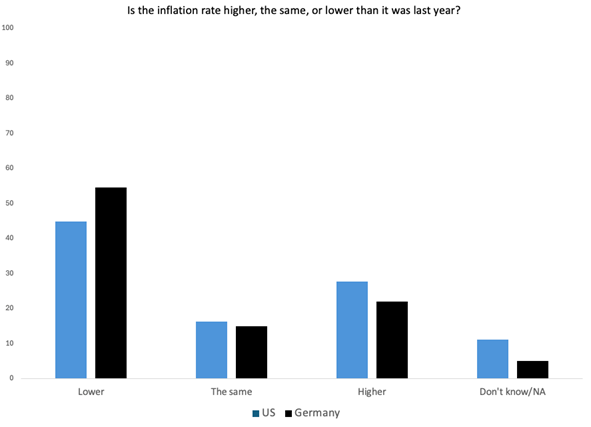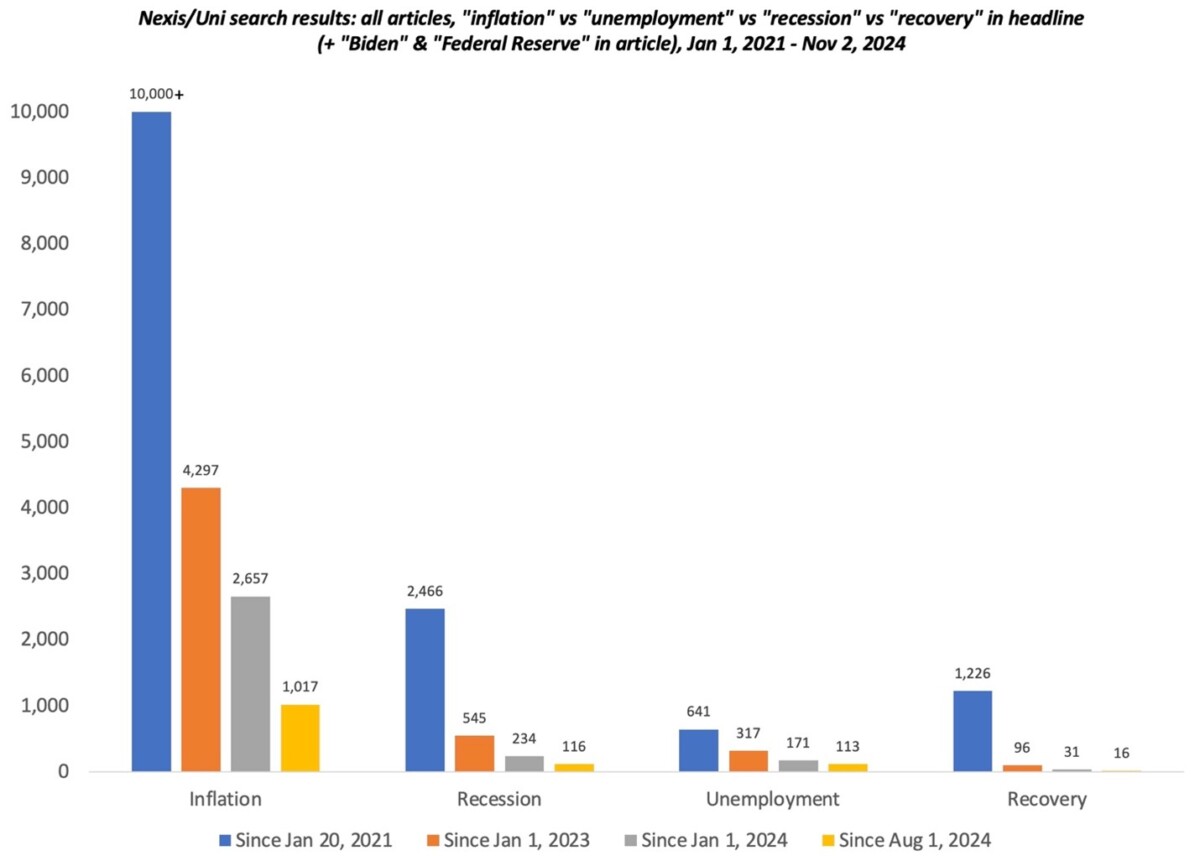At present we’re happy to current a visitor contribution by Mark Copelovitch (Political Science and La Follette Faculty, College of Wisconsin – Madison) and Michael Wagner (Journalism and Mass Communication, College of Wisconsin – Madison).
Final week, John Burns-Murdoch of the Monetary Occasions documented the anti-incumbent backlash in 2024 throughout the developed world. Donald Trump’s victory over Vice President Kamala Harris is sort of clearly a part of this broader worldwide pattern.
Burns-Murdoch linked Trump’s victory primarily to inflation: “Voters don’t like excessive costs, so that they punished the Democrats for being in cost when inflation hit.” This has rapidly turn into the traditional knowledge in regards to the US election. We’re skeptical of this declare, and our analysis suggests we should always keep away from speeding to such conclusions. Our proof means that voters’ anger is most intently associated to what they’re listening to about inflation from information sources. Even after we look at what individuals know about inflation and, certainly, what they’re experiencing within the financial system itself, it’s listening to in regards to the horrible financial system, slightly than dwelling within the respectable one, that appears to be driving voter habits.
By YouGov, we performed surveys, from October 30 to November 4, within the US and Germany, during which we requested 2000 people in every nation about their views on inflation, the financial system, and politics. Our outcomes strongly help the anti-incumbent backlash argument. Within the US, solely 29.9% of respondents approve (9.6% “strongly”) of President Joe Biden, whereas 54.3% disapprove (41.0% “strongly”). In Germany, Chancellor Olaf Scholz is much more unpopular: solely 15.4% approve (2.4% “strongly”) of his efficiency, whereas 60% disapprove (a staggering 36.4% “strongly”).
However anger at incumbents doesn’t seem like pushed by anger about inflation and the financial system – no less than if we imply this in materials phrases. To make sure, an amazing share of these in our surveys have been involved about inflation. On a 5-point scale, 62.9% of German respondents have been “involved” or “very involved” about inflation, and 59.5% thought it was a “large” or “very large” downside for themselves and their households. Within the US, these numbers have been even increased: 76.1% and 67.1%.But when requested about their private monetary state of affairs, few mentioned they or their household are struggling (22.1% within the US, solely 12.3% in Germany). In reality, extra mentioned they’re dwelling comfortably (26.7% within the US, 36.6% Germany), and there’s solely a modest correlation within the US between household monetary state of affairs and whether or not individuals assume inflation is an issue or approe of President Biden. The hyperlink between inflation concern and Biden approval is a bit increased, however that implies a number of these involved about inflation will not be actually feeling materials hardship from it. Germany seems to be comparable: the correlation between approval of Olaf Scholz and whether or not one thinks inflation is a private/household downside is extraordinarily low.
Furthermore, after we requested people if and the way they might pay an sudden invoice of both 500, 2000, or4000 {dollars} (euros), their most typical reply was that they might be capable of pay from money financial savings (34.7% in US, 57.3% in Germany) or credit score (33.1% in US, 18.9% in Germany), whereas far fewer mentioned they might not be capable of pay (19.3% in US, 12.4% in Germany) in any respect.. Voters could also be indignant about inflation and the financial system, however they merely don’t report being worse off materially than 4 years in the past.
Nonetheless, each People and Germans are deeply pessimistic in regards to the financial system. 52.4% of our US respondents (and 72.6% of Germans) assume the financial system has gotten worse within the final 12 months. Much more shockingly, extra American respondents (39.6%) assume the US is at present in recession than not (37.5%), regardless of 4.1% unemployment and 45 consecutive months of job progress. The German financial system is definitely a large number: he nation is in recession and actual wages and revenue stay beneath 2019 ranges. However the US financial system is booming, and most People are higher off on nearly each metric (wages, revenue, consumption), than 4 years in the past, even controlling for inflation.

So is that this an info downside? Effectively, it’s not a factual info downside. Most individuals know precise costs. We requested our survey respondents in regards to the value of gasoline, milk, and the nationwide inflation price, they usually overwhelmingly answered accurately, inside tiny margins. It doesn’t seem like the case that people will not be conscious of precise costs, akin to the truth that gasoline now prices almost $2 much less per gallon within the US than it did in 2022, or the truth that US milk costs are 5% decrease than two years in the past.
And but, regardless of having a transparent grasp of actual costs, about one quarter of respondents in each nations mentioned inflation is increased now than a 12 months in the past.

Most People and Germans appear to assume the financial system is horrible and getting worse, regardless of their private state of affairs being superb. Many assume inflation is rising, regardless of realizing the precise value of milk and gasoline. And, most notably, they assume opposition events perceive their issues higher than incumbents: within the US, 38.9% of these we surveyed mentioned that the Democrats assume inflation is a “large” or “very large” downside on a 5-point scale, whereas 71.4% mentioned the identical of the Republicans. In Germany, these numbers for the SPD and AfD, respectively, have been 44.5% vs 52.4%.
The backlash towards incumbents is actual, however it’s only not directly associated to factual details about inflation and the financial system. As a substitute, voter issues seem like pushed extra by perceptions about these items than materials realities. This confirms findings of our previous analysis, the place we’ve discovered that the one biggest determinant of voters’ issues with inflation within the US, in 2022, was not any measure of fabric well-being, however slightly the quantity of media – and particularly conservative media like Fox Information and speak radio – one consumes. We all know that US media protection since 2021 has been overwhelmingly biased towards damaging matters (inflation and recession) as an alternative of excellent information (low unemployment and the unprecedentedly speedy financial restoration), and this has been very true of extra conservative media retailers.

Put merely, to replace James Carville’s well-known chestnut, it seems to be the “info financial system,” silly. People have overwhelmingly heard that the US financial system is horrible, and many citizens – regardless of reporting that they’re doing superb materially –clearly have internalized that message and brought it out on the incumbent political social gathering.
Voters are clearly sad with incumbents. Maybe, as Burns-Murdoch argues, voters are additionally reacting to broader “geopolitical turmoil” and immigration. What is much much less clear is that voters punished the Democrats final week as a result of they hate and are affected by inflation and the horrible financial system. The frenzy to make this the traditional knowledge in regards to the 2024 US presidential election is untimely.
This put up written by Mark Copelovitch and Michael Wagner.
